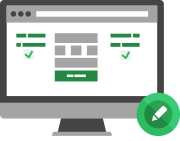Certified Data Analysis Professional Online Course

Introduction
The Certified Data Analysis Professional is a first level, hands-on training course aimed at equipping you with the necessary concepts and tools needed to perform basic statistical and analytics reporting activities, in order to generate value out of the existing data.
The course will provide you with the knowledge required for understanding distinct methods used in the interpretation of statistical data. Also, by attending this certification program, you will be able to understand the basic methodology used in statistical interpretation of quantitative data and become proficient in using key Microsoft Excel features, histograms and Pareto Charts.
The course presents an overview of the basic data analysis concepts, such as data accuracy, preparation and comparability. Furthermore, the course provides both a general understanding upon basic analysis tools, such as mean, median and mode, as well as advanced operations, such as hypothesis testing or tentative sensitivity analysis.
Bonus: Premium subscription on smartKPIs.com - Available for 6 months, providing access to 500 fully documented KPIs and over 20.000 KPIs enlisted and one research report from the Top 25 KPIs series.
3 Key business benefits
- Achieve processes clarity and strategy optimization by implementing data analysis frameworks;
- Optimize the performance reporting processes by closing the gaps found in the data analysis tools used within your own business;
- Attain superior results by implementing data analysis procedures, which improve the achievement of your company’s objectives.
5 Benefits
- Improve the organization’s decision making process by gaining knowledge on data analysis and interpretation;
- Obtain the most relevant data you need by setting up a customized data analysis process;
- Achieve the management’s buy-in, by understanding the utility of implementing customized data analysis methodology in daily business activities;
- Provide a logical framework for understanding data analysis instruments;
- Obtain premium recognition as a Certified Data Analysis Professional, by completing a unique learning program.
Learning objectives
- Develop a hands-on, practical overview of data analysis and connected topics;
- Integrate statistical concepts and analysis tools that are widely used in corporate analytics environments;
- Analyze examples of practical applications for statistical methods used in solving real-life business issues;
- Acquire mastery of basic MS Excel and statistical techniques though practical examples;
- Solve complex problems, using intermediate and advanced Excel techniques.
Evaluation
The certification process is finalized only when you complete all of the 3 stages of the learning experience. You will receive the Certified Data Analysis Professional diploma after you have successfully completed all of the 3 stages of the learning experience. This certifies the skills and knowledge related to performance measurement field.
Agenda
Module 1 – Basics of data analysis
- Definitions and usefulness of data analysis;
- Data analysis process;
- Realignment and governance of data analysis;
- Module 1 Review.
Module 2 – Data quality
- Module 2 Introduction;
- Data completeness;
- Data accuracy;
- Logical inconsistencies;
- Data sampling errors;
- Data comparability;
- Economic/ business interpretation of qualitative data;
- Module 2 Review.
Module 3 – Organizing, synthesizing and aggregating data
- Data aggregation;
- Data preparation;
- Expert judgement;
- Meta-analysis and evaluation synthesis;
- Normalization of data;
- Module 3 Review.
Module 4 – Statistical Analysis Tools
- Statistical analysis tools: average, mean and median;
- Identifying and analyzing trends: variance and standards deviation;
- Hypothesis testing;
- Module 4 review.
Module 5 - Data Visualization and Pattern Detection
- Data visualization definition;
- Data visualization representations;
- Time series;
- Level, trend, seasonality and noise in time series data;
- Autocorrelation;
- Module 5 Review.
Module 6 - Data Comparison
- Module 6 Introduction;
- Analysis using histograms;
- Histograms using broadband data;
- Rules for interpreting data and formulating conclusions;
- Module 6 Review.
Module 7 - Univariate and Multivariate Analysis
- Module 7 Introduction;
- Univariate and Multivariate Analysis: Introduction;
- Descriptive measures of univariate data: Numeric variables;
- Multivariate analysis: introduction;
- Correlation analysis;
- Type of data and analysis options;
- Module 7 Review.
Module 8 - Regression Analysis
- Module 8 Introduction;
- Regression Analysis: introduction;
- Linear Regression Analysis: Assessing the Estimation;
- Autocorrelation, Heteroskedasticity, Multicollinearity;
- Linear Regression and Other Types of Regression Models;
- Types of Variables Used;
- Regression Analysis using Excel: ANALYSIS TOOLPACK;
- Regression Analysis: Initial Results and Final Results;
- Presenting and Interpreting Results;
- Regression Analysis: A Good Model;
- Module 8 Review.
Module 9 - Probability and Confidence
- Module 9 Introduction;
- Statistics and Probability: Overview;
- Probability and Confidence Intervals;
- Hypothesis Testing;
- Probability and Significance. P-values, Calculation and Meaning;
- Contingency Tables and The Chi Square;
- Anova;
- Anova single-factor analysis;
- Module 9 Review.
Module 10 - From Exploratory to Predictive Modelling
- Module 10 Introduction;
- Probability and Modelling;
- Confidence limits;
- Limits;
- Module 10 Review.
Module 11 - Data Dimensionality
- Module 11 Introduction;
- Data Dimensionality and Small Sample Sizes;
- The Student’s T test and the paired-sample test;
- Results for Paired T –Test;
- Big Data;
- Sampling Big Data with Excel;
- Sources of Error and Data Cleaning;
- Module 11 Review.
Module 12 - Software Enablers for Data Analysis
- Module 12 Introduction;
- Activate Analysis Toolpak in Excel;
- How to Use Data Analysis Tools;
- Module 12 Review.
Ágnes Ilyés holds valuable experience in data analysis, as during both her university and working years she had participated in numerous marketing related research projects where survey based primary researches were conducted and a lot of data were evaluated.
She mainly uses SPSS statistical program to analyze data. She has experience with the following analyses: Chi2 analysis, Variance analysis, Correlation analysis, t-test, factor- and cluster analysis.
Ágnes also deepened her knowledge by teaching interferential statistics as an external lecturer on the university, on economics and business administration faculty, marketing specialization.
As a Business Research Analyst at the KPI Institute she also has numerous possibilities to capitalize her experience in this field.
What is the difference between the face-to-face course and the online course?
The course structure is the same, regardless of the delivery method. However, the autonomy given by the self-paced instruction is balanced by the lack of live interaction with the facilitator and other participants while attending.
What are the prerequisites for taking a course?
There is no prerequisites required.
Who should I contact if I have questions throughout the course?
You can communicate with your instructor through the eLearning forum or by email. You are highly encouraged to use these ways of communications.
How do I register for an online course?
You can register for an online course the same way you would register for any training course organized by The KPI Institute.
If you enroll through The KPI Institute Store you will receive a confirmation email containing instructions for accessing your online course. If you enroll by fax or telephone, you will also receive your confirmation by email.
How can I download course materials?
Downloadable course materials are available on our eLearning Platform. These include course slides, assignment templates and supplemental documents that will help you brush up or dive deeper on concepts within that course. However, video presentations are not available for download.
What kind of computer equipment do I need in order to take an online course?
Operating Systems: Windows 7 and newer, Mac OSX 10.6 and newer, Linux - chromeOS.
Browsers: You must update to the newest version of whatever browser you are using. We recommend using Chrome, Firefox or Safari, beta versions of browsers are not supported and Internet Explorer is problematic. Please make sure that your web browser has JavaScript and cookies enabled.
Who do I contact for technical support?
If you are experiencing technical difficulties, contact our Customer Service team: [email protected] or +61 3 9028 2223
Online Purchasing Instructions


Choose a product and add it to the cart

Add more products or proceed to checkout

Fill in all the information and finalize the order

Check your email for confirmation and details
